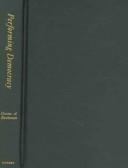| Listing 1 - 2 of 2 |
Sort by
|

ISBN: 0226078264 0226078272 Year: 2006 Publisher: Chicago University of Chicago press
Abstract | Keywords | Export | Availability | Bookmark
 Loading...
Loading...Choose an application
- Reference Manager
- EndNote
- RefWorks (Direct export to RefWorks)
Folk music --- Folk songs, Bulgarian --- Folk music groups --- Folk dancing, Bulgarian. --- Musique folklorique --- Chansons folkloriques bulgares --- Groupes folkloriques --- Danse folklorique bulgare --- Social aspects --- History and criticism. --- History and criticism --- Aspect social --- Histoire et critique --- #SBIB:39A5 --- #SBIB:39A72 --- Musical groups --- Bulgarian ballads and songs --- Bulgarian folk songs --- Ethnic music --- Traditional music --- Folklore --- Music --- Bulgarian folk dancing --- Kunst, habitat, materiële cultuur en ontspanning --- Etnografie: Europa --- Folk dancing, Bulgarian

ISBN: 1282759361 9786612759369 0520932056 9780520932050 0520245032 9780520245037 9781282759367 6612759364 Year: 2006 Volume: 5 Publisher: Berkeley, CA : University of California Press,
Abstract | Keywords | Export | Availability | Bookmark
 Loading...
Loading...Choose an application
- Reference Manager
- EndNote
- RefWorks (Direct export to RefWorks)
It is well known that Béla Bartók had an extraordinary ability to synthesize Western art music with the folk music of Eastern Europe. What this rich and beautifully written study makes clear is that, contrary to much prevailing thought about the great twentieth-century Hungarian composer, Bartók was also strongly influenced by the art-music traditions of his native country. Drawing from a wide array of material including contemporary reviews and little known Hungarian documents, David Schneider presents a new approach to Bartók that acknowledges the composer's debt to a variety of Hungarian music traditions as well as to influential contemporaries such as Igor Stravinsky. Putting representative works from each decade beginning with Bartók's graduation from the Music Academy in 1903 until his departure for the United States in 1940 under critical lens, Schneider reads the composer's artistic output as both a continuation and a profound transformation of the very national tradition he repeatedly rejected in public. By clarifying why Bartók felt compelled to obscure his ties to the past and by illuminating what that past actually was, Schneider dispels myths about Bartók's relationship to nineteenth-century traditions and at the same time provides a new perspective on the relationship between nationalism and modernism in early-twentieth century music.
Music --- Composers --- Art music --- Art music, Western --- Classical music --- Musical compositions --- Musical works --- Serious music --- Western art music --- Western music (Western countries) --- History and criticism. --- Bartók, Bela, --- Bartokas, B., --- Criticism and interpretation. --- Compositeurs --- Musique --- Biographies --- Histoire et critique --- Bartók, Béla, --- Bartók, Béla, --- Bartók, Béla, -- 1881-1945 -- Criticism and interpretation.. --- Composers -- Hungary -- Biography.. --- Music -- Hungary -- 20th century -- History and criticism. --- 1900s. --- 1940s. --- 19th century. --- 20th century composer. --- 20th century music. --- academic. --- composer. --- eastern europe. --- european history. --- folk music. --- folk stories. --- folk tales. --- folklore. --- hungarian composer. --- hungarian music. --- hungary. --- igor stravinsky. --- modernism. --- music academy. --- musical tradition. --- nationalism. --- scholarly. --- traditional music. --- western art. --- western music. --- western world.
| Listing 1 - 2 of 2 |
Sort by
|

 Search
Search Feedback
Feedback About
About Help
Help News
News